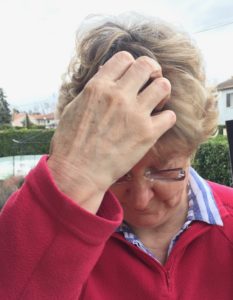
Reposted after update 2024
Bit of a tricky one, this.
Whatever genre you write, something of you, the author, creeps into your work. Perhaps it’s shades of your opinion, your wishes or even your frustrations. Perhaps you are writing a story that you wish you were living in a far, far away place and time.
At the very least, your ways of expression imbue your story. Your language and selection of vocabulary will slide in, sometimes consciously, sometimes subconsciously. And your choice of worldview, the slant you put on events, will be there.
Now that’s all fair enough; you are the creator of your book and its world. Some readers will love it, some it will leave cold, others will hate its guts (Hopefully, not too many of those!). We would be a very boring people if, sheep-like, we all liked the same thing or the same book.
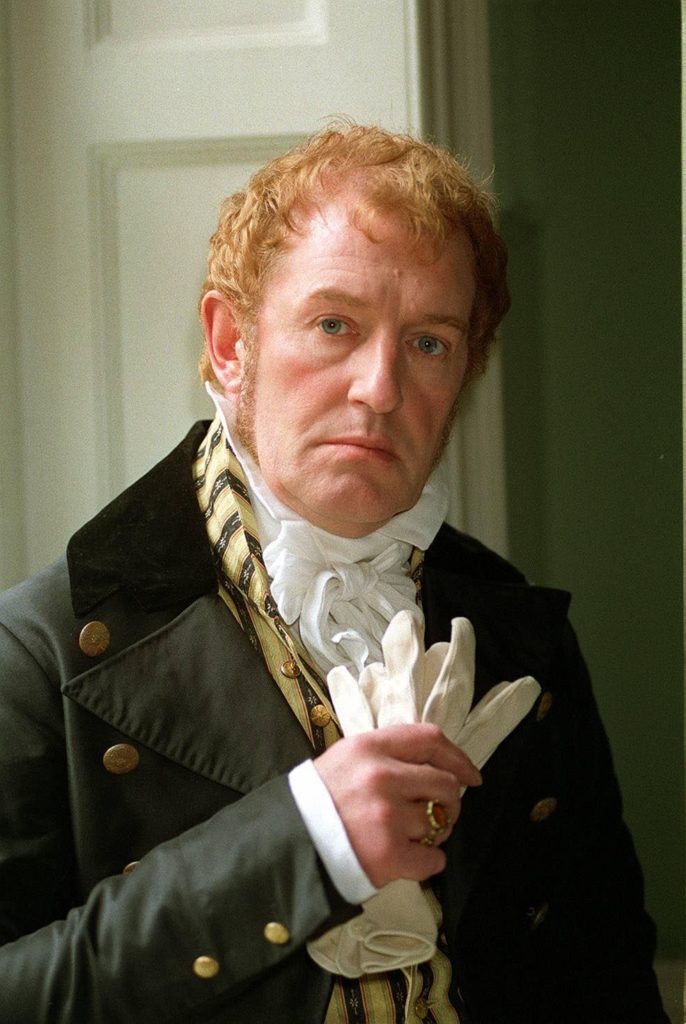 Coryn Redgrave as Sir Walter Elliot (BBC) Inside the book, characters can express every kind of view – political, moral or social. They can outrage, amuse, annoy and give joy to the other characters. An author can have enormous fun playing around with characters and their ideas and values.
Short of outright offence and hate speech, you can have them say anything obnoxious and politically incorrect as long as it serves your story.
One character I would have LOVED to have written is the pompous and self-absorbed Sir Walter Elliot of Kellynch Hall (Persuasion, Jane Austen). She must have had such fun writing him (and sending him up!). I have to admit there are aspects of him in Lucius Mitelus Superbus in PERFIDITAS. 😉
So, that’s the book world where you can do virtually anything.
But what about you, the author?As readers have bought your book and paid to come to an event to see you, it’s your duty as well as commercial sense to be pleasant and approachable. I love chatting to readers, and I can talk about the world of Roma Nova until the cows have come home, been milked, slept and gone back out to the fields the next day.
This is a total pleasure for me, but for some shyer authors it can be difficult as they are often incredibly modest and self-deprecating about their work. But that’s part of the author’s job and readers are often curious about the writer’s life, ideas and values.
Being anything but authentic as an author is not a good idea; it’s deceptive and unfair to your readers.
They want to read about and meet a real person. I imagine it’s quite hard work keeping up a false persona and you’re bound to come unstuck at some point. But an author doesn’t have to reveal their inside leg measurement, number of fillings or how often they did their child’s homework for them. They can sift what they want to tell readers, but what they make public should be true and genuine.
But should they express political views, especially in these febrile political times?
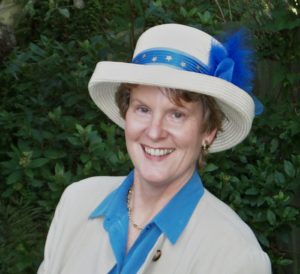 My EU hat in 1999. I won a competition with it! Passionately held values and ideals are part of anybody’s personality; they are often what makes somebody unique, or at least remarkable. Many things contribute to these – upbringing, education, experience at work and in relationships – and however careful an author is publicly, something will slip through. That’s being human.
However, expressing strong views whether it’s about Brexit, American elections, financial scandals, climate change and other large-scale events can be a double-edged sword. Some readers, whether in Real Life or on social media, will like you standing up for a cause, some will disagree and some quietly unfollow you. Others will buy all your books, or vow never to touch another one. That’s the risk.
But if you stay neutral on everything, you run into the danger of looking characterless; a person of no view and no emotional side to them. And the second possible risk is that you may look rather bland and as if you bury your head and have no interest in the world around you.
Given the inflammatory nature of social media, and some of the unspeakable people who lurk there, I can understand the reluctance and sincere wish not to become embroiled. But that’s not me. Being a ‘political animal’ from my earliest years, I do tend to get involved in things. As I get older, I find the urge stronger. I aim to be calm and polite, analytical and informational and rant only very, very occasionally.
I am an author who likes to sell her books, and I hope I don’t put anybody off, but the freedom to express my views is such an intrinsic part of me and a privilege which I’m not giving up any time soon.
 Refusal to contemplate either the extreme left(LFI) or the extreme right in France(RN) in 2024 Alison Morton is the author of Roma Nova thrillers – INCEPTIO, CARINA (novella), PERFIDITAS, SUCCESSIO, AURELIA, NEXUS (novella), INSURRECTIO and RETALIO, and ROMA NOVA EXTRA, a collection of short stories. Audiobooks are available for four of the series. Double Identity, a contemporary conspiracy, starts a new series of thrillers. JULIA PRIMA, Roma Nova story set in the late 4th century, starts the Foundation stories. The sequel, EXSILIUM, is now out.
Download ‘Welcome to Alison Morton’s Thriller Worlds’, a FREE eBook, as a thank you gift when you sign up to Alison’s monthly email update. You’ll also be among the first to know about news and book progress before everybody else, and take part in giveaways.
If you enjoyed this post, do share it with your friends!Like this:Like Loading...
 Probably done through ignorance, carelessness or thoughtlessness, this graphic aroused some strong reaction in the digiverse. Probably done through ignorance, carelessness or thoughtlessness, this graphic aroused some strong reaction in the digiverse.
Some thought it silly, others were mortally offended. Most were insulted.
I think it springs from a sincere wish to attract mature writers, those who haven’t been able to write a creative work because of family or work commitments or a lack of confidence.
The genre is speculative literature, presumably along the lines of Ursula Le Guin or Margaret Atwood. So we’re looking at, for example, science fiction, fantasy, alternate history, horror, dystopian, magical realism and steampunk. Basically, anything that bends reality.
Yes, these genres may seem superficial and trashy to some people, but in the famous words, “They know not of what they speak.” I don’t think people would consider Kazuo Ishiguro’s Never Let Me Go or P D James’ Children of Men as trashy.
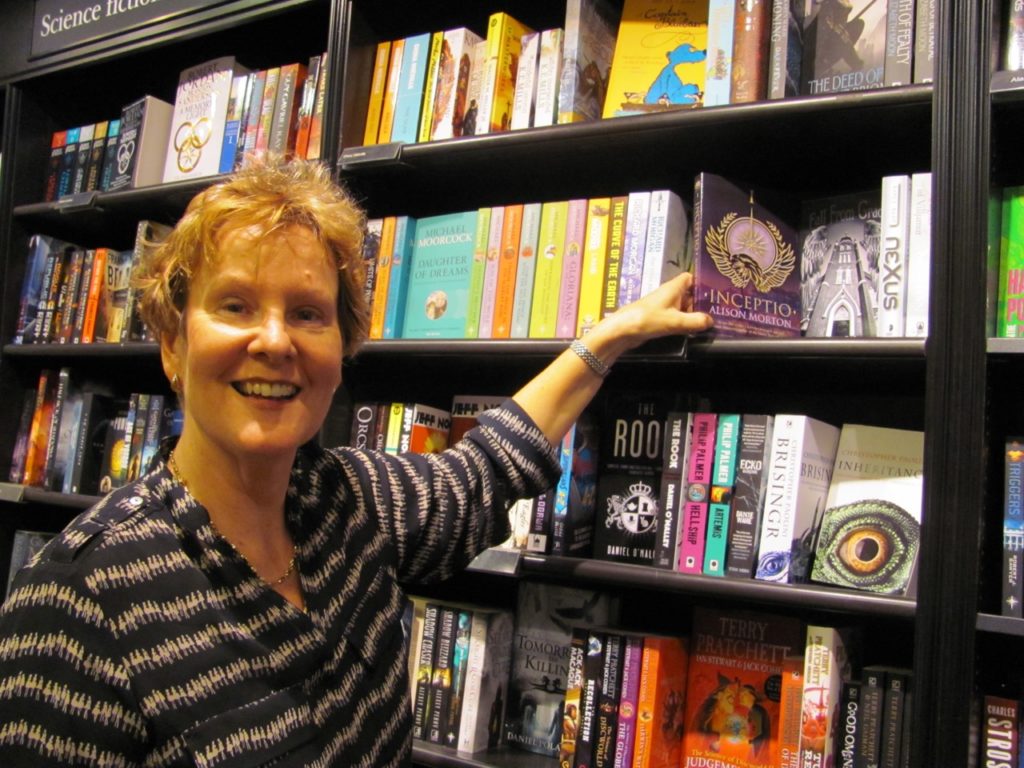 INCEPTIO in Waterstones (me at 62 years, 7 months)! As a writer of alternate history thrillers that (I hope!) have some thoughtful moments, this is my field. My first Roma Nova thriller, INCEPTIO, published then by SilverWood Books, came out in 2013 when I was 62. In no way did I consider myself an older writer. I was just a super-thrilled writer holding her first book.
So what upset people about this cartoon graphic?
The Older Writers’ Grant has been awarded annually since 2004 to writers who are at least fifty years of age at the time of application to assist such writers who are just starting to work at a professional level. So far so good. This could give all sorts of a boost to such writers especially those taking writing up as a later career.
But… (You know I always have a ‘but’.)
Is the image in the advert a true idea of how people, especially younger people, see women and men over 50?
I consulted some of my fellow writers. These two comments sum up most of them:
“I’m 72. And the image in that ad is complete bollocks. My friends are in their 60-80’s and are superb! Filled with youth and energy!”
“This might work if eligibility started at age 100.”
Several posted photos of themselves at 67, 73, 70, nearly 60. I won’t repost as I haven’t asked their permission, but they’re on my Facebook author page. Gosh, they’re a fit and youthful lot. Most are wearing jeans or sports kit.
Ageism something that’s hard to avoid in any line of work, in the arts, and in every aspect of our culture, which is a great pity. It can inspire, especially when you’re told to take it easy now you’ve retired. (Falls over laughing.) Such a remark tends to spur me on. I mean, who doesn’t like a challenge?
Perhaps agents and publishers would prefer to publish a first novel by a 30-year-old writer with a potential career ahead of several decades than by a 75-year-old veteran writer, no matter how distinguished the latter’s career. Unless your recent book or books have sold exceptionally well, it’s a rough market for a new book, no matter its quality.
But older writers have secret assets: they’ve lived a long time and gained many insights through experience, something many 30-year-olds haven’t had time to accumulate. They’re also more crafty, patient and persistent. They’ve had to be as they’ve survived life so far.
But my core argument is not about age itself, but the perception of age. Yes, you can laugh off the image at the top as a silly joke. The couple in the image are cute and endearing, but totally unreal. It’s somebody’s limiting and rather patronising view of two older people.
In Real Life, we wear jeans and trainers, go out dancing, drink, drive sporty cars and work ridiculous schedules. We’re often looking after our children’s children or our own parents. Either requires stamina, patience and an agile mind, Yes, we probably get a little more tired, but most of us are not at the slippers and knitted rug stage, if that was ever a thing.

I applaud the initiative of the Older Writers’ Grant. I applaud any grant that supports writers, but I believe the Speculative Literature Foundation should really rethink their PR. This daft image does nobody any credit, least of all them.
And let’s just see writers as writers. It’s what they produce that counts, not the count of their years.
Cheers!
Alison Morton is the author of Roma Nova thrillers – INCEPTIO, CARINA (novella), PERFIDITAS, SUCCESSIO, AURELIA, NEXUS (novella), INSURRECTIO and RETALIO, and ROMA NOVA EXTRA, a collection of short stories. Audiobooks are available for four of the series. Double Identity, a contemporary conspiracy, starts a new series of thrillers. JULIA PRIMA, Roma Nova story set in the late 4th century, starts the Foundation stories. The sequel, EXSILIUM, is now out.
Find out more about Roma Nova, its origins, stories and heroines and taste world the latest contemporary thriller Double Identity… Download ‘Welcome to Alison Morton’s Thriller Worlds’, a FREE eBook, as a thank you gift when you sign up to Alison’s monthly email update. You’ll also be among the first to know about news and book progress before everybody else, and take part in giveaways.
If you enjoyed this post, do share it with your friends!Like this:Like Loading...
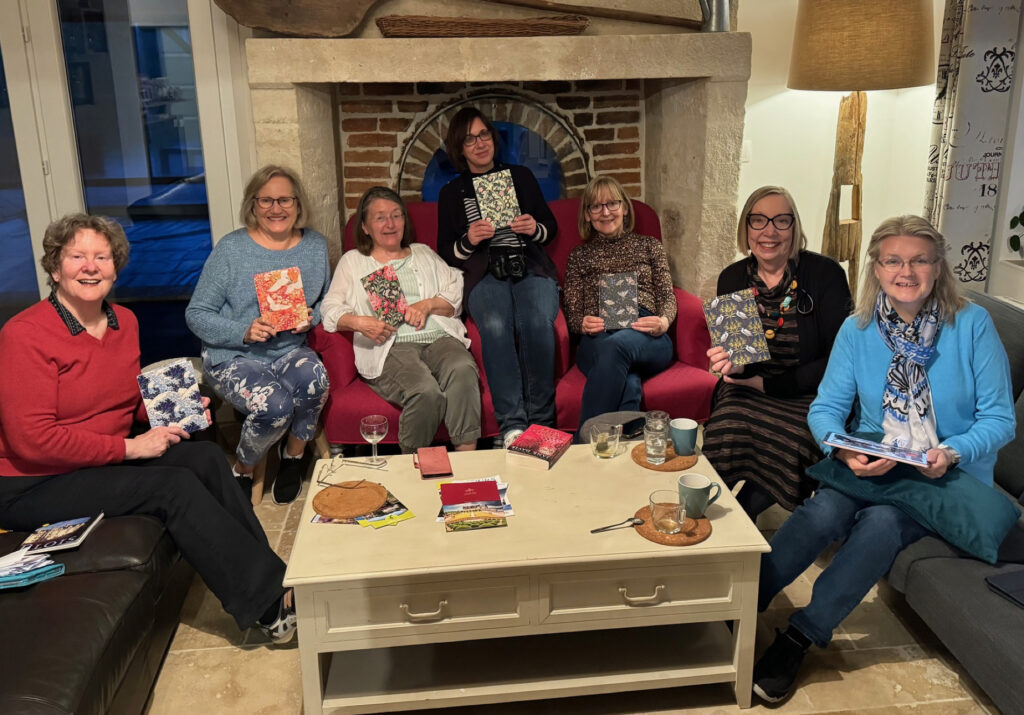 Left to right: Me, Carol Cooper, Jean Gill, Jane Davis, Karen Inglis, Clare Flynn, Lorna Fergusson in April 2024 No, I don’t mean retreating from your writing, but going on a writing retreat.
A retreat implies withdrawing from the world.
A writing retreat implies getting away from the everyday and being able to sit down and write without Real Life intruding.
How does this work?
Retreats can be single person ones. I know a number of writers who book themselves into a local budget hotel where they can get basic food on tap, where somebody else cleans the room and where they are left alone. They are in their home area, but do not have the distractions of making meals, taking dogs for walks or children to school or being tempted by household chores. (Believe me, sometimes loading the dishwasher is a great displacement activity!)
Fully catered retreats usually take place in a special writing venue or even off peak university accommodation. A little more upmarket from a budget hotel. You may know some of the others on the retreat or nobody else, but you do come together for meals.
Self-catered joint retreats are with a group of writing friends, usually at the same level of experience, but not necessarily in the same genre. One person books it with a property owner and everybody chips in with the food expenses and takes turns in cooking and tidying. You have to know the other people reasonably well…
Why do it?
- Your mental health – you are a human being who needs contact with like-minded souls
- Sharing experiences and information about competitions, agents, the ever-increasing number of routes to publication, conferences, writing and book events
- Obtaining thoughtful critiques from other professional writers
- Honing writing techniques and approaches to work – not just how to sling words together, but about characterisation, the senses, novel or poetry structure, research and, increasingly, technology
- Um, having writerly fun which includes excursions to inspiring places.
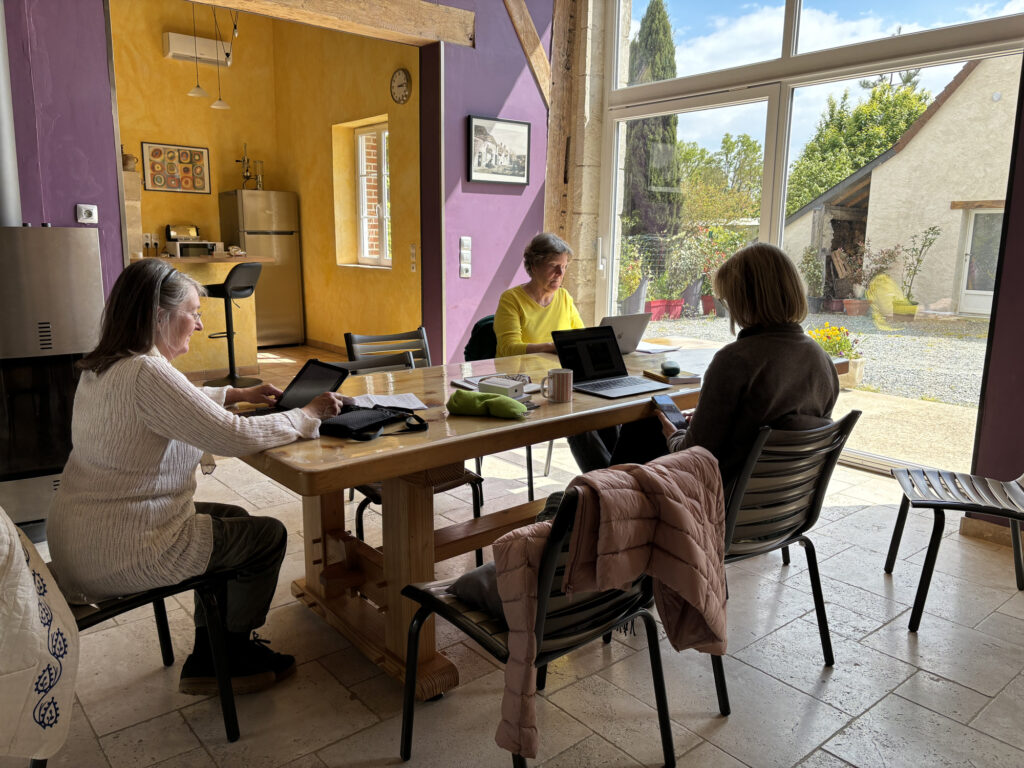 Working! But you do have to do some writing. This is not a jolly or a holiday.
I recently organised one lasting a week near Tours in the Loire Valley. We achieved word counts between 2,000 and 15,000. Some did in-depth marketing, others tech projects, others extensive research. But we all went home inspired.
We did manage some excursions – this was the Loire Valley, after all.
 Château d’Amboise – dull weather, but a chance to touch (royal) history
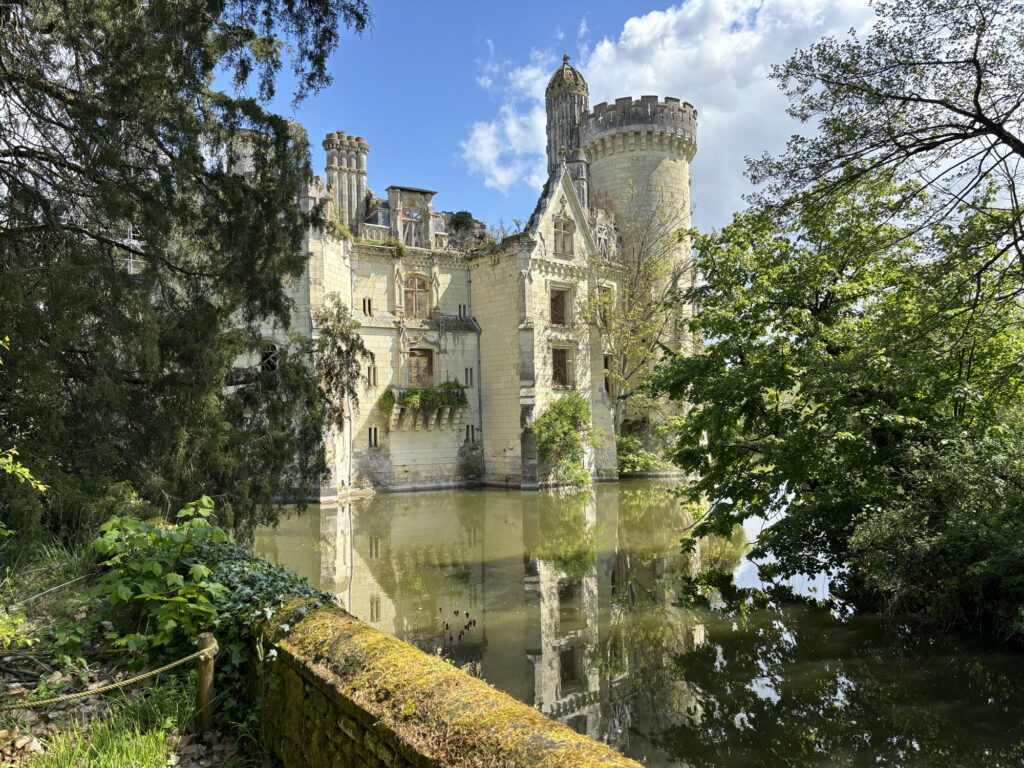 La Mothe-Chandeniers – a romantic ruin
 Château de Chenonceau – the castle of women Why not organise your own retreat to spur on your own writing? It’s well worth it!
Alison Morton is the author of Roma Nova thrillers – INCEPTIO, CARINA (novella), PERFIDITAS, SUCCESSIO, AURELIA, NEXUS (novella), INSURRECTIO and RETALIO, and ROMA NOVA EXTRA, a collection of short stories. Audiobooks are available for four of the series. Double Identity, a contemporary conspiracy, starts a new series of thrillers. JULIA PRIMA, Roma Nova story set in the late 4th century, starts the Foundation stories. The sequel, EXSILIUM, is now out.
Find out more about Roma Nova, its origins, stories and heroines and taste world the latest contemporary thriller Double Identity… Download ‘Welcome to Alison Morton’s Thriller Worlds’, a FREE eBook, as a thank you gift when you sign up to Alison’s monthly email update. You’ll also be among the first to know about news and book progress before everybody else, and take part in giveaways.
If you enjoyed this post, do share it with your friends!Like this:Like Loading...
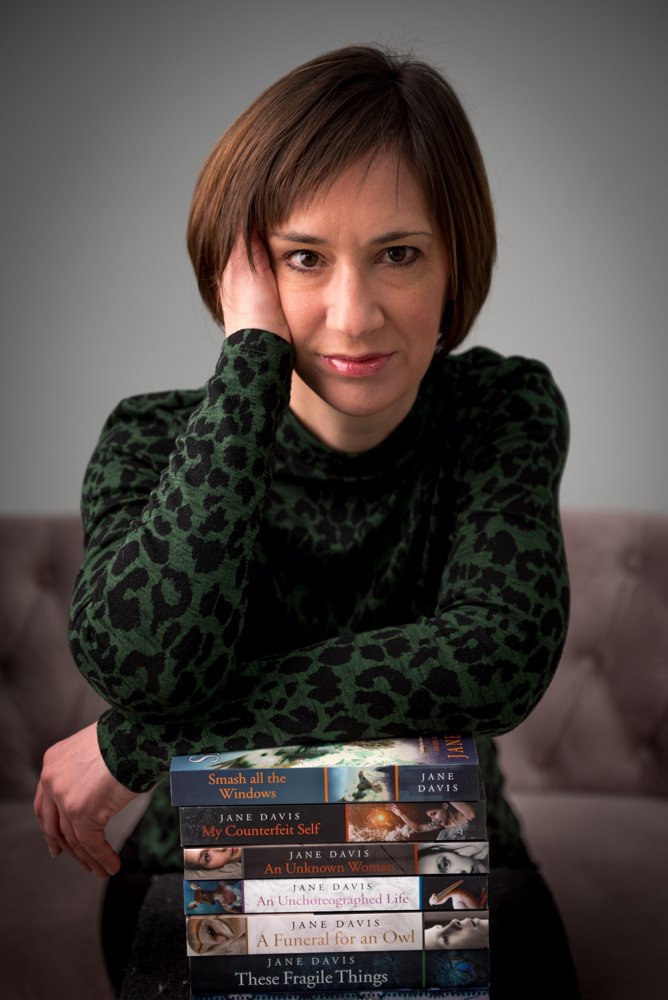 Today I’m delighted to welcome writing friend Jane Davis back to the writing blog. I’ve loved her books; they regularly appear in my best books of the year round up. Her first novel, ‘Half-Truths and White Lies’’, won a national award established with the aim of finding the next Joanne Harris. Today I’m delighted to welcome writing friend Jane Davis back to the writing blog. I’ve loved her books; they regularly appear in my best books of the year round up. Her first novel, ‘Half-Truths and White Lies’’, won a national award established with the aim of finding the next Joanne Harris.
Further recognition followed in 2016 with ‘An Unknown Woman’ being named Self-Published Book of the Year by Writing Magazine/the David St John Thomas Charitable Trust, as well as being shortlisted in the IAN Awards, and in 2019 with ‘Smash all the Windows’’ winning the inaugural Selfies Book Award. Her novel, ‘At the Stroke of Nine O’Clock’ was featured by The Lady Magazine as one of their favourite books set in the 1950s, selected as a Historical Novel Society Editor’s Choice, and shortlisted for the Selfies Book Awards 2021.
Interested in how people behave under pressure, Jane introduces her characters when they are in highly volatile situations and then, in her words, she throws them to the lions. The themes she explores are diverse, ranging from pioneering female photographers, to relatives seeking justice for the victims of a fictional disaster.
Jane lives in Carshalton, Surrey, in what was originally the ticket office for a Victorian pleasure gardens, known locally as ‘the gingerbread house.’ Her house frequently features in her fiction. In fact, she burnt it to the ground in the opening chapter of ‘An Unknown Woman’ and in ‘Small Eden’ it was the gardener’s cottage. When she isn’t writing, you may spot Jane disappearing up the side of a mountain with a camera in hand.
Now she’s letting me grill her about her latest, The Bookseller’s Wife.
What was the seed of the story in The Bookseller’s Wife?
In September 2022, I took a small research trip to the ancient church of St Mary’s in Merton. Small, because it’s only a ten-minute walk from my mother’s house. As a child, I took ballet lessons in the parish hall, but I rarely ventured inside the church, which dates from the tenth century. My intention was to visit the place where Nelson worshiped and see his custom-made bench, now heavily alarmed, but which one of my aunts was given special permission to sit on when she was a seven-year-old bridesmaid at her sister’s wedding. Walking among the gravestones, one caught my eye.
DORCAS, WIFE OF J LACKINGTON
Bookseller, Finsbury Square
Died January 27th 1795, aged 46 years.
What could be more intriguing? I read in the church guide that Dorcas was an avid reader of novels and took a leading share in running her husband’s book shop – The ‘Temple of the Muses,’ Finsbury Square. I had to know more!
Where did your research lead you?
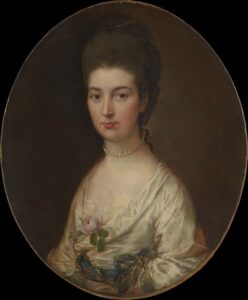 A model for Dorcas? Mrs Ralph Izard by Thomas Gainsborough I learned from parish records that Dorcas was the sole survivor of six children born to Jemima Turton and her husband, Samuel. The statistic seems shocking now, but in 18th century London only one in five children made it to the age of five.
As always with historical research, it’s easier to find information about a man than a woman, and so I turned first to her husband. James Lackington left us with two memoirs, written primarily to promote himself as a successful entrepreneurial innovator in the world of bookselling. While his writing must be taken with a liberal pinch of salt, there is substance in dates and key events.
James Lackington’s memoirs tell us that Dorcas’s mother, Jemima Turton, was grand-daughter of the Honourable Sir John Turton, Baron of the Exchequer and Justice of the King’s Bench. She was so proud of her lineage that she kept her maiden name in the only way a woman could – by marrying a man with the same surname, possible a cousin. Since Samuel Turton had a fortune of his own, the family should have been comfortably off, but owing to ‘an unhappy turn for gaming,’ he was forced to turn to trade. Even after setting himself up as a saddler’s ironmonger, he couldn’t give up gambling. These days we would recognise addiction rather than weakness of character. Jemima Turton didn’t live to see her husband’s financial ruin, dying in early 1773. Dorcas then supported her father, setting up a day-school for girls and taking in needlework.
How old was Dorcas at that time?
We meet Dorcas when she is twenty-five, a pivotal age for woman. Jane Barker wrote in her 1688 poem, A Virgin Life, that she hoped was able to remain ‘Fearless of twenty-five and all its train, / Of slights or scorns, or being called Old Maid.’ With the average age for marriage standing at seventeen, she would be passing from a young single woman to old maid, and very much aware that her marriage prospects were rapidly decreasing.
You mention that Dorcas set up a day-school for girls. What kind of education would she have received?
While sons of her class were often sent to boarding schools, girls were might be sent to ‘dame schools’ but more commonly were taught by governesses at home. Lessons might involve reading, writing, languages and music, but the chief emphasis was to prepare girls to become to become wives and mothers.
A popular book at the time was The Governess by Sarah Fielding. It begins with an introduction:
‘The Design of the following Sheets is an endeavour to cultivate an early inclination to Benevolence, and a love of Virtue in the minds of young women, by trying to shew them that their True Interest is concerned in cherishing and improving those amiable Dispositions into Habits and keeping down all rough and boisterous Passions, and that from this alone they can propose to themselves to arrive at true Happiness in any of the Stations in Life allotted to the Female Character.’
I don’t know about you, but already I find myself chaffing – and that is before we learn that ‘Mr Teachum was a very sensible man who took great pains in improving his wife.’
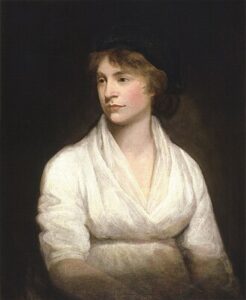 Mary Wollstonecraft by John Opie But changes were afoot. Towards the end of the century, support for the education of daughters was mounting. The growing merchant class saw the importance of educating daughters so that they could take active roles in the running of family businesses. Early campaigners that daughters’ education should equal sons’ included Mary Wollstonecraft, the mother of Mary Shelley.
Like Dorcas, Mary Wollstonecraft was born into prosperity to a father who squandered the family money. And like Dorcas, Wollstonecraft opened a small girls’ school. She would go on to write A Vindication on the Rights of Women and Thoughts on the Education of Daughters, arguing that daughters who were raised from an early age to prize physical beauty and personal charms made poor citizens, inadequate companions to men, and even ineffective mothers. She insisted that education should be universal and freely accessible, so that women could cultivate their minds, learn skills and gain financial independence. I like to think that although Dorcas turned to teaching out of necessity, she would have shared those views.
The other thing that we learn from James Lackington’s memoirs is that Dorcas was immoderately fond of books, and would frequently read until morning… Who having acquired a few ideas, was at that time restless to increase them. The picture we get is of a young woman who is curious, intelligent, practical and resourceful.
Thank you, Jane. These are particularly pertinent thoughts during Women’s History Month.
And Jane has given us the treat of an excerpt from The Bookseller’s Wife:
As she brushes out her hair Dorcas mulls over the evening’s conversation. Is there one among her pupils who could do great things? Judith, perhaps? In her mind’s eye, she sees John Milton’s Eve, peering into a pool of still water and falling in love with her own reflection. But it’s unfair to single out Judith. Are her girls even aware of what possibilities might be open to them? Though there are constant murmurings of a cultural revolution, Dorcas reluctantly concedes that her father was right: Bassi was an exception. So too are almost all of the remarkable contemporary women Dorcas can name. Would Elizabeth Caslon have been in a position to put her name to a company had her husband not died without making a will? Dorcas’s brush snags on a knot. She takes a fistful of hair close to her scalp so that she can work at it. Whenever a woman is strong or intelligent or steps away from the hearth, it is said that she possesses masculine qualities. This is the world her pupils must navigate. One that is hostile to women who dare to display confidence, fail to fawn, and when cut off mid-sentence by fathers or husbands, do not lower their doe-like eyes in submission.
Yet these obstacles shouldn’t deter Dorcas. Provided her pupils’ conversation sparkles, provided they know when to be sweetness and light, there is nothing to prevent her from introducing examples of remarkable womanhood into their lessons. How else shall they develop ambitions of their own? After all, earlier this century a female monarch sat on the throne. Is that perhaps a suitable question for discussion? Why a female monarch failed to promote the education of women, so that they might be admitted to universities and thence to the professions? Dorcas sets down her brush. It would be a start.
What’s The Bookseller’s Wife about?
Books have been her only solace. Now they’re about to change her life.
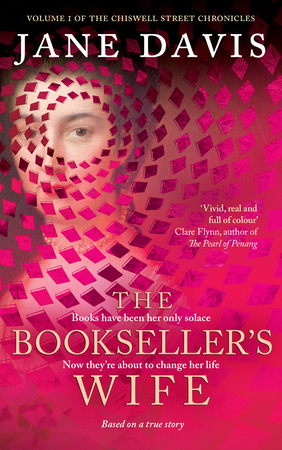 London, 1775: The only surviving child of six, Dorcas Turton should have been heiress to a powerful family name. But after her mother’s untimely death, she is stunned by the discovery that her father’s compulsive gambling has brought them close to ruin. With the threat of debtor’s prison looming large, she must employ all her ingenuity to keep their creditors at bay. London, 1775: The only surviving child of six, Dorcas Turton should have been heiress to a powerful family name. But after her mother’s untimely death, she is stunned by the discovery that her father’s compulsive gambling has brought them close to ruin. With the threat of debtor’s prison looming large, she must employ all her ingenuity to keep their creditors at bay.
Fortunately, ingenuity is something Dorcas is not short of. An avid reader, novels have taught her the lessons her governess failed to. Forsaking hopes of marriage and children, she opens a day-school for girls. But unbeknown to Dorcas, her father has not given up his extravagant ways. When bailiffs come pounding on the door, their only option is to take in lodgers.
The arrival of larger-than-life James Lackington and his wife Nancy breathes new life into the diminished household. Mr Lackington aspires to be a bookseller, and what James Lackington sets out to do, he tends to achieve. Soon Dorcas discovers she is not only guilty of envying Mrs Lackington her strong simple faith and adaptable nature. Loath though she is to admit it, she begins to envy her Mr Lackington…
Based on a true story, Jane Davis’s latest historical novel is for book-lovers everywhere, delivering unforgettable characters, a portrait of Georgian London on the brink of change, and a love song to the life-changing power of the written word.
Buy now at your favourite ebook store: https://books2read.com/thebooksellerswife (universal link)
Paperback release date: 16 April 2024

––––––––––
Connect with Jane
Website: https://jane-davis.co.uk
Facebook: https://www.facebook.com/JaneDavisAuthorPage/
Twitter/X: https://twitter.com/janedavisauthor
Goodreads: https://www.goodreads.com/author/show/6869939.Jane_Davis
––––––––––
My thoughts
Absorbed by Dorcas’s character and values as I was, I found Jane’s vivid and detailed description of her life, her environment and her decisions outstanding. Here is a young woman as intelligent and capable as Jane Eyre, and as principled and determined as Lizzy Bennett. Faced with penury, she gathers up her inner strength and sets to in a practical way to make her life possible and passable. Resolute is a word that could apply to her, especially in respect of her tiresome father.
Every page is a treat – the writing is excellent. I thoroughly recommend this thoughtful and clever read.
Alison Morton is the author of Roma Nova thrillers – INCEPTIO, CARINA (novella), PERFIDITAS, SUCCESSIO, AURELIA, NEXUS (novella), INSURRECTIO and RETALIO, and ROMA NOVA EXTRA, a collection of short stories. Audiobooks are available for four of the series. Double Identity, a contemporary conspiracy, starts a new series of thrillers. JULIA PRIMA, Roma Nova story set in the late 4th century, starts the Foundation stories. The sequel, EXSILIUM, is now out.
Find out more about Roma Nova, its origins, stories and heroines and taste world the latest contemporary thriller Double Identity… Download ‘Welcome to Alison Morton’s Thriller Worlds’, a FREE eBook, as a thank you gift when you sign up to Alison’s monthly email update. You’ll also be among the first to know about news and book progress before everybody else, and take part in giveaways.
If you enjoyed this post, do share it with your friends!Like this:Like Loading...
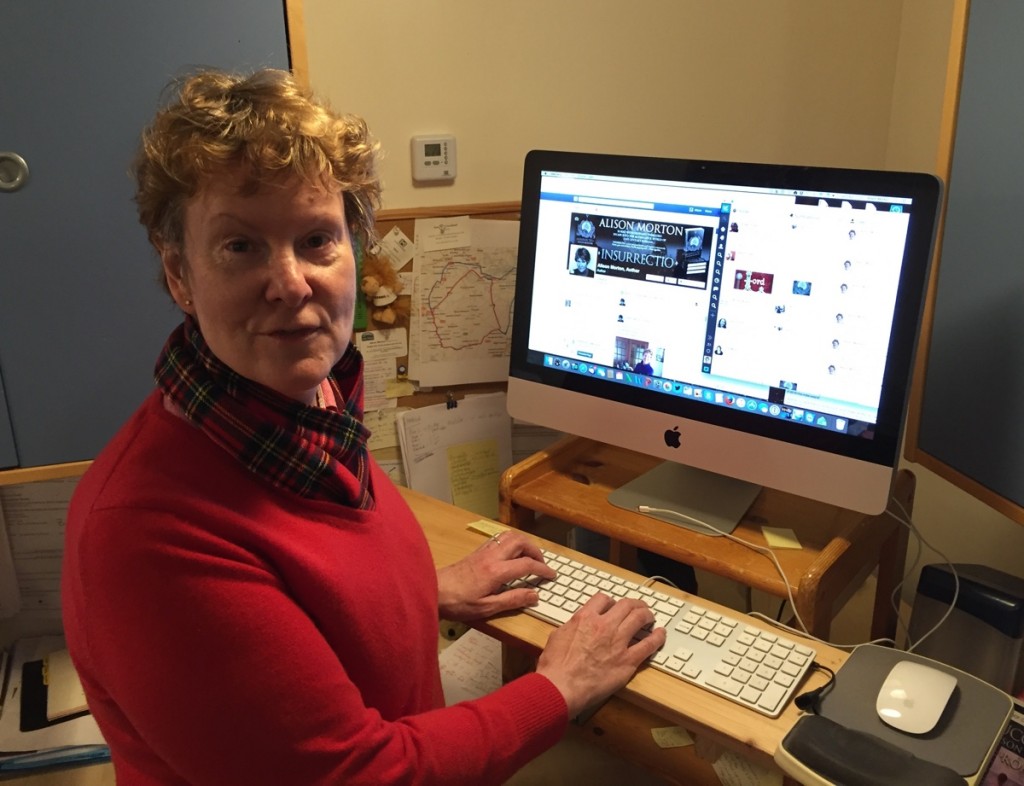 Yes and no. Yes and no.
Writing a novel is creative – you have to have a purpose, some characters and a setting which all interact. Throw in a triggering act to stir them all up and get the story going. Storytellers have known this since the year dot.
A modern novelist is basically a storyteller with a keyboard. But she/he like the traditional storyteller has an imagination that can cast back or forward several thousand years, that looks into the darkest and lightest parts of the human psyche, that digs out motivation, phobias, obsessions and quests, that lets us delight at sunlight, trees and adventure on the high seas and cower at shadows, brutes with cudgels and our own dark thoughts. And one that takes us to places we will never go in real life…
But however uplifting or terrifying, however moral or dubious the story, it has to be written down if it’s to be read by others. Getting the story across and catapulting readers into their worlds is what writers are supposed to do. Perfectly understandably, they want to make a few bob; for some this is the main motivation. Not mine, although I’m always pleased to receive those transfers falling into my bank account.
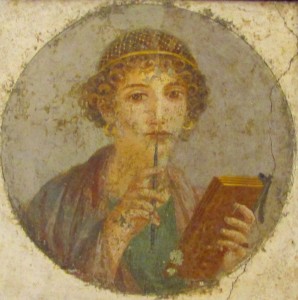 As a series writer, I have my characters already. I let them run in my head for a while, have some conversations, get into arguments, flounce off, make up, do something incredibly noble, then something incredibly stupid. After that I buckle down to sketch out my excuse for a plan: 30 lines which start with the inciting incident and end with the resolution. I insert three crises/turning points, a black moment and a climax – much more detail here. As a series writer, I have my characters already. I let them run in my head for a while, have some conversations, get into arguments, flounce off, make up, do something incredibly noble, then something incredibly stupid. After that I buckle down to sketch out my excuse for a plan: 30 lines which start with the inciting incident and end with the resolution. I insert three crises/turning points, a black moment and a climax – much more detail here.
The next step is to type something, usually a large bold ‘I‘ in the centre of the top line of the first page. (I use Roman numerals, for some reason. 😉 ) I look artistically into the distance, which is actually the corner of my office, half close my eyes, then, opening the said eyes, look at the screen and type the first conversation in one and a half line space. Five hundred words later, I get a cup of tea. Then I repeat. And after lunch, I repeat (The typing, not the lunch).
Writing a long piece of fiction entails dedicated slogging away for intense periods in between the chief activity of the day, i.e. going on Facebook. And then you do it again for the next few weeks/months. My books are generally 90-100,000 words. That takes a fair bit of typing. I generally bash the story out, creating a first draft that’s pretty average. However, after six books it seems to be getting easier to produce a reasonably acceptable initial draft.
Editing follows and this is a several stage process: self-edit (me), critique partner edit (free), structural edit (paid professional), copy edit (paid professional), proof-read (me). I don’t put the manuscript aside for a few weeks. It’s not good enough to enter the fallow meadow; it needs a good scything first. After a well-deserved lie-in or even a day off, I gird up, send the draft to my Kindle and read it through. I ignore all the glitches, make no notes and plough on to the end. The objective is to ensure that the story basically hangs together as a story.

Next, I print the whole thing out. Lover of eBooks that I am, I know that I spot more little horrors on paper. I blogged four years ago about my 1-12 steps for this process and I still follow it. One thing I particularly check is each character’s individual time line. Then, sick of the thing, I send the manuscript to my critique partner and have another lie-in.
My critique partner has the instincts of a velociraptor on steroids and marks up the manuscript with humorous, direct and clear notes. A lot of them. I do the same for her. We count it a triumph to receive a sheet back with no red pen marks. This relationship has taken years of trust building and is completely brutal honesty.

More revisions, including some structural. Luckily, they are now not many, but at every editing stage I see other things as I go through. At this stage I check each sentence to see if I can find better words and fiddle with the word order to make it clearer or tighter; basically, add sparkle. Being formal, I’d call it a self executed line-edit.
When I think it’s finished, it’s off to the copy-editor. Yes, she checks my grammar and punctuation, but also continuity, cohesion, sometimes facts, but always the flow. Like any writer, I try to get my speech marks, line returns, hanging indents, spelling and typing completely right – that’s part of a writer’s job – but the editor nails them all down. We work on a collaborative, on-going basis; she raises queries, I answer them in little batches as we go along.
Then the copy-edited manuscript lands in my inbox and I read through and discuss any points with the editor that we haven’t covered during the edit. I transfer it to the Kindle (again!) and read through (again!). By this point, I am so fed up with it that I’m on the verge of consigning the characters to the pit of Tartarus and hurling myself in after them.
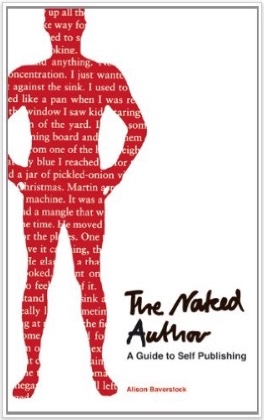 When the galleys come back a few weeks later, formatted and set, I’ve calmed down enough to proof-read them. When the galleys come back a few weeks later, formatted and set, I’ve calmed down enough to proof-read them.
Now this could be dangerous. But in the many years spent as a project manager and editor of translations I notched up at least a couple of million words in proof-reading. I start at the last chapter and work back. I can only do an hour at a time because the concentration of reading each word in each line is intense. For my novels I follow the excellent Alison Baverstock’s methodology in The Naked Author.
So, yes, it’s a process, but no, as without the creativity, you wouldn’t have a story. Thoughts?
(Updated and republished February 2024)
Alison Morton is the author of Roma Nova thrillers – INCEPTIO, CARINA (novella), PERFIDITAS, SUCCESSIO, AURELIA, NEXUS (novella), INSURRECTIO and RETALIO, and ROMA NOVA EXTRA, a collection of short stories. Audiobooks are available for four of the series. Double Identity, a contemporary conspiracy, starts a new series of thrillers. JULIA PRIMA, Roma Nova story set in the late 4th century, starts the Foundation stories. The sequel, EXSILIUM, will be out on 27 February 2024.
Find out more about Roma Nova, its origins, stories and heroines and taste world the latest contemporary thriller Double Identity… Download ‘Welcome to Alison Morton’s Thriller Worlds’, a FREE eBook, as a thank you gift when you sign up to Alison’s monthly email update. You’ll also be among the first to know about news and book progress before everybody else, and take part in giveaways.
If you enjoyed this post, do share it with your friends!Like this:Like Loading...
|
Subscribe to Blog via Email
Join 51 other subscribers.
Categories
Archive
|


































